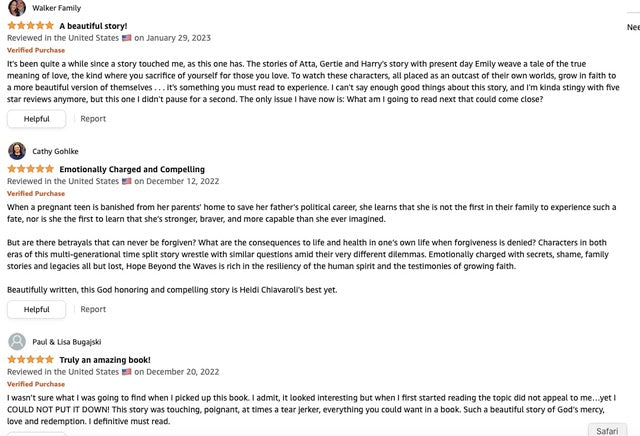Heidi Chiavaroli
Hope Beyond the Waves (Hardcover)
Hope Beyond the Waves (Hardcover)
Couldn't load pickup availability
About this premium hardcover:
Prefer a different format? Click here.
From award-winning author Heidi Chiavaroli comes a sweeping dual timeline story that explores hope and enduring love in the midst of the impossible.
Massachusetts, 1993
After making a grievous mistake that will change her life forever, Emily Robertson is sent away to live with her grandmother on Cape Cod. When Emily finds a timeworn photograph buried in a drawer, she realizes her grandmother has concealed a secret even bigger than her own. Will convincing Gram to reveal their family history help Emily make the most important decision of her life or will it prove her parents right—that family scandal is better off buried and forgotten?
Massachusetts, 1916
Atta Schaeffer plans to marry the man of her dreams and whisk her little sister away from their abusive father. But when she is diagnosed with a dreaded malady, Atta is forced into a life of exile, leaving her sister in harm’s way.
On Penikese Island, Atta’s best hope lies with Harry Mayhew, a doctor who seeks a cure for his patients at any cost. But when experiments fail, Atta runs from Harry—and from God. Can she return to her sister before it’s too late? Or will her illness consume both her body and soul?
A testament to faith and love, Hope Beyond the Waves is the raw account of the journey of two generations of women running from desperate situations toward irresistible hope.

“It's been quite a while since a story touched me, as this one has.”
“Beautifully written, this God honoring and compelling story is Heidi Chiavaroli’s best yet.”
“I COULD NOT PUT IT DOWN!”
“In my top reads this year! An amazing story!"
“Moving.”
“Fantastic!"
“Heidi is a master storyteller always and when you think she can’t possibly get any better, she raises the bar yet again."

This product is a premium HARDCOVER.
Prefer a different format? Click here.
Here's what people are saying:

Enjoy a sample from Hope Beyond the Waves
Osterville, Massachusetts
April, 1993
I stand rigid, arms pinned to my sides as my mother wraps me in a loose hug in Gram’s foyer.
“I’m so glad we thought of this arrangement,” she says.
Arrangement. As if shipping me off and hiding me away is a plan we’d come up with together.
My father kisses me on the forehead, but it’s awkward. Probably a show for my grandmother. He’s kissed plenty of babies on the campaign trail, after all—this is likely no different.
“Be good, Sweet Pea.” He turns to my grandmother, who barely comes up to his armpits. “Keep in touch, Mom. Don’t hesitate to call if…” His gaze flicks to me and he doesn’t finish his sentence.
What? Does he think I’ll find a cute boy in Gram’s retirement village? One who will get me in bigger trouble than Bryan already has?
“Oh, we’ll be perfectly fine, won’t we, Emily?” Gram smiles up at me, her lips the color of the Radio Flyer wagon I had as a child.
As much as I want my parents to leave—and don’t want them to leave all at the same time—I can’t bring myself to answer.
My father’s smile wavers. “We better hit the road. We’ll talk soon.”
And then they’re gone.
A twisting ache beneath my breastbone catches me off guard and I whirl around and race up the stairs to my new bedroom. I hardly know my grandmother, and I refuse to let her see me emotional.
Once in my room, I watch my parents’ Honda Accord grow smaller from behind the gauzy curtains.
The car stops at the end of the road, and a crazy hope they’ll change their minds and come back floods me. But no. Dad spins the wheel right and Mom doesn’t turn her head to look back at the house even once.
They’ll drive back to our perfect suburban home in Maryland in their spotless car and have their friends over as if nothing has happened. If asked about me, a lie will roll off their tongues. (Lying is permissible only in the direst of circumstances, which my mother has told me countless times, this absolutely is.)
I can hear her now. “Emily is spending the summer with her grandmother. She’s long overdue for a visit.”
Maybe not a complete lie, but certainly not the whole truth.
I step away from the curtain and flop on the twin bed, covered in a hideous floral bedspread. It’s uglier than the pale yellow wallpaper peeling off the walls. The scent of mothballs and Avon perfume coat the entire house. I try to imagine my father growing up in this small coastal home, but I can’t.
I glance at the phone on the nightstand beside a stack of books I’ve brought with me. A new book called The Giver by Lois Lowry. Island of the Blue Dolphins by Scott O’Dell. The Outsiders by S.E. Hinton—a reading assignment for my new school. And The Thorn Birds. Mom didn’t let me read the latter when I was a freshman but had recently made a snide remark about me and the heroine having something in common.
I’d tried not to care what that was but couldn’t contain my curiosity—I bought the novel from Waldenbooks with the birthday money my great-uncle sent last week. Now, I scan the room for a picture of him, but don’t see any family photographs. Not that I would recognize him, anyway. All he does is send money and cards.
I push a lock of my shoulder length, light brown hair from my eyes and reach for the phone before realizing my mistake. I’ve received enough lectures from Mom to earn a college credit in how-to-act-at-Gram’s.
“No calls back home,” Mom had said. “Your grandmother doesn’t have a long-distance plan.”
But Ashley…. Just to hear my best friend’s voice would make all of this better. Surely I’m imagining the space between us since I told her my secret. I’ve always had a good imagination—too good, really. I used to imagine E.T. hid in the depths of my closet when I was in elementary school. I probably imagined Bryan actually meant those three little words he’d told me in the back seat of his Dodge Viper.
Yes, that had to be it—my imagination had gotten the better of me. Ashley’s parents must have heard rumors. They’d warned my best friend to stay away, but of course Ashley was totally on my side. Best friends forever, right?
I run a finger along the chain at my neck to the pendant—half a heart with the letters Be and Fri. Ashley gave it to me the summer before high school, taking the other half of the heart for herself and promising that no matter what high school brought, we’d get through it together.
No matter what.
I scoop up the phone and dial the long-ago memorized number, praying that Ashley—and not her parents—will answer. She would be home from school by now but her parents should be at work—a perfect time to call.
“Hello?”
Relief washes over me. “Ashley, it’s me. Thank God you answered. I’m dying over here.” I pause to catch a breath and roll over on my back, settling in for one of our long conversations. She’d want to know what Gram’s house is like, if the neighbors have any cute teenage sons, if the beach is as beautiful as I imagined. Of course, we’d also dump on Bryan. Affirm how all boys with flashy sports cars, football letters, Homecoming King titles, and smooth words should be annihilated from the face of the earth forever.
“Emily…hey.”
The phone freezes in my hand. She sounds…distant.
I swallow. “Is your Mom right there?” Was that why she was being so careful?
Ashley clears her throat. “Listen, Em. I’m going to be super busy these next few weeks with graduation and prom. And I also have to think about college…maybe we’ll have time to catch up when you get back.”
When I get back? But by then she’d be at college, living the dorm life, finding a new best friend to give a necklace to. I shake my head. “I—I don’t understand—”
“I’m sorry, but we’re in different places in life right now, you know? You’ve got a lot going on, and so do I. Take care of yourself, Emily.”
The line goes dead, but I can’t bring myself to return the phone to its cradle. My breaths come fast and heavy and Gram’s walls threaten to close in around me. Is this what a panic attack feels like?
I wind my hand around the broken heart at my neck. No, it can’t be true. No matter what. That’s what kind of friends we were supposed to be. How could the one person I thought would support me to the end abandon me?
I drape my arm over my forehead and close my eyes, my breaths carrying away with themselves, taking me to a place of despair. A tear slips its way down the side of my face.
“Emily!”
I swipe at the wetness and jolt up in the bed, shoving my emotions aside. I can never let Gram know how upset I am. “Yes, Gram?”
“Come help with dinner, please.”
I sniff and hang up the phone. I can’t afford to wallow in self-pity. Things would get better. By the end of the summer, all would return to normal.
I sit slumped on the edge of the bed. Though I have a few fond, hazy memories of my grandmother and this house during my growing up years, once we moved to Maryland and Dad won the election shortly thereafter, our time with Gram had waned. She sent birthday and Christmas cards with money, but when Mom gave me the choice to write or call with a “thank you,” I always chose a short, impersonal note over an awkward telephone call.
After a few deep breaths, I drag myself to my feet and over the threshold. I pass her room on my way to the stairs and hesitate. While Gram knows my big secret, I know next to nothing about her. She hasn’t bothered to visit us much. And now, I’m supposed to be grateful she has taken me in, go along with her rules and help her move her bedroom downstairs so she doesn’t have to navigate the stairs any longer. I walk in, noting the floral artwork on the opposite wall.
A pan clatters downstairs as my gaze sweeps over the room. Gram’s comforter is only slightly less hideous than mine—that same yellow color as my wallpaper. There is a single bureau across from the bed, a small writing desk between two windows, and a nightstand with a Bible, a rosary, and a journal on top of it. Above the headboard is a picture too small to tastefully be placed there—a black-and-white wedding photo. I lean against the bed for a closer look.
I recognize traces of my grandmother in the youthful face of the bride. Hard to believe someone so old could’ve ever been that young. She is holding a huge bouquet of calla lilies and wearing a simple bridal cap with a veil that melts into the rest of her dress. My grandfather—a man who died before I was old enough to remember him—stands beside her tall and proud and handsome in a tuxedo and slicked-back hair. They are both wearing small smiles, as if they know a secret the rest of us don’t.
My gaze drops to the nightstand and I slide open the drawer. A fifty-dollar bill is tucked in the side, but I pass it by for a worn, black-and-white picture of two women and one man in front of a clapboard cottage.
I pull it out. The woman on the right wears a long dress and blouse. Her face looks a bit disfigured—her nose too big. The woman on the left—about my age, maybe a little older—wears a jacket over her dress.
She looks slightly familiar, but I can’t say for certain it’s my grandmother. The man in the middle holds what I think is a mandolin with deformed hands. Why would Gram keep a picture of a man other than her husband in her bedside table? I flip the photo over.
Penikese, 1917
I know this name, don’t I? Yes, my grandfather opened a school for troubled boys on the island off the coast of Massachusetts. Dad used that bit of positive family history in his campaign. Did my grandmother visit there when she was younger? She’d been a nurse at one time—that fact had made its way into Dad’s campaign, too. Maybe the island used to be a hospital of sorts?
“Emily!”
I jump and drop the picture back in its place, closing the drawer as quietly as I can. “Coming!”
I take my time going down the stairs, acting as if I’ve just dragged myself out of bed. Gram stirs rice on the stove. Her gray hair is short and curly. I wonder if she wears curlers to bed. She moves around the kitchen well for being eighty…eighty-something, I’m not exactly sure how old she is.
She raises an eyebrow at my arrival. The gesture draws neat, crinkly lines on her forehead. “I would appreciate your help with dinner every night.”
“Yes, ma’am,” I say respectfully.
“And if you’d like a tour of my room, next time I suggest you ask me to be your guide.”
I open my mouth to make an excuse…I saw what I thought was an abandoned earring on the floor or I wanted to see what sort of furniture we needed to move downstairs this summer—but the lies stop up behind my lips at the look Gram is giving me. She apparently hasn’t lost an ounce of her mental clarity.
“Yes, ma’am.” If I’m not careful, she might figure out a whole bunch more about me than I want her to know. “What can I help with?”
“After you wash your hands, you may cut the broccoli.”
I slip my hands under the faucet with a pump of soap. How am I going to manage with Gram watching my every move for the next several months?
I take the broccoli and knife and saw off the little green florets.
“Child! You’re mutilating it. Here.” She takes the knife from me and demonstrates how to cut the broccoli into neat little trees. “Didn’t your mother teach you how to cook?”
I snort. “You don’t know my mother, do you?”
Gram smiles for the first time since she saw my father earlier this afternoon. “That’s right. Anne never did have much talent in the kitchen. How did you survive all your growing up years?”
I shrug. “Our chef.”
Gram makes a tsking sound as she shakes her head. “My son has done quite well for himself, hasn’t he?” A moment’s pause. “Although I suppose if he’d concentrated more on his daughter than his career….”
I plop the head of broccoli down on the cutting board. “Look.”
She raises an eyebrow, as if in challenge.
I take it. I might as well let her know right off that just because I let my parents talk me into this banishment doesn’t mean that I plan to slink around in shame.
“I’m sorry my parents dumped my pregnant self onto you. And I get why I’m here—I’m an embarrassment to them. An embarrassment to my school, my community. Dad’s career. I’m a freakin’ outcast. But what’s done is done.”
Gram’s mouth turns into a hard, grim line. “Dear, I shouldn’t have implied…but, I promise I won’t belittle you for your mistakes. In return, I expect you to use decent language while in this house. Is that understood?”
I sigh, but say, “Yes.” If she’s upset over the word “freakin’,” this is going to be a long summer.
“And as far as being an outcast…I’m not sure you have the slightest clue what being an outcast involves.”
As if she knows. And she’d just promised not to belittle me. I glance down at the unfinished broccoli head and plunk down the knife. “I’m not hungry.” I leave and stomp up the stairs to my room.
I half expect her to demand I come back and help. But my mini temper tantrum is met with silence.
Once in my room, I close the door behind me—not quite a slam, but with enough teenage angst to be sure Gram hears.
But as soon as I’m alone in my room, the fight immediately drains out of me. I stare at the phone, willing it to ring. Willing Ashley’s voice to be on the other end, to say she made a mistake in severing our friendship. Heck, I’d even take a call from Mom letting me know she misses me, but she wouldn’t be home yet.
My hopes are met with nothing but silence.
I am completely and utterly alone. One bad decision—a moment that couldn’t have lasted more than ten minutes—has cast me from my home, my school, my friends. It threatens my chance at going to college, my hopes of being an English teacher…everything.
I think of my parents’ driving away without looking back. Part of their punishment is making sure I know just how ashamed they are of me.
If only they knew I feel enough shame for all of us.







